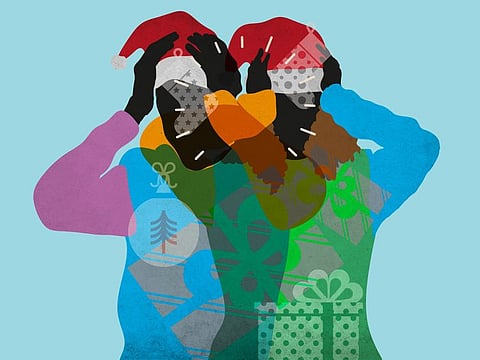Why holiday stress can be unbearable
Being with people you love becomes more important than small digs and paper towel napkins

Anyone desperate enough to Google the term “holiday stress” will be rewarded (or become more overwhelmed) with about 395,000,000 results. Limit the search to “holiday stress statistics 2019” and the results come down to a measly 28,100,000 or so. There are even specific memes and GIFs on how to handle the financial, social and emotional stresses of the season, including my current favourite, the article that ran in this newspaper by a Buddhist teacher who advises practising “acceptance”, an activity that even on non-holidays can often seem as challenging as climbing Mount Everest in an ice storm.
Still, the alternative can be worse. As the Harvard Mahoney Neuroscience Institute’s newsletter put it, “Because the holiday season often requires us to keep track of and pay attention to a greater number of responsibilities than usual, the brain’s prefrontal cortex goes into overdrive. Over time, a high level of demand can decrease memory, halt production of new brain cells and cause existing brain cells to die.”
I know all about holiday stress. For years I’ve hosted a Thanksgiving buffet for around 30 people and a Christmas Eve dinner for a somewhat smaller group, both of which started as a buffer against my own parents’ poor showing on holidays. (In the Dysfunctional Parents Olympics, mine wouldn’t even qualify for bronze medals, though my mother in particular had her moments, as when she routinely looked around my quite comfortable home and announced that she wished she had the money to “help us to fix the place up.” Never mind that she had the money, and the place didn’t need fixing up.)
As these events became traditions, they, too, became more stressful, what with food prep, snapping at my husband over when and how he intended to pitch in and, as the years went by, trying to keep my ageing father from doing just that. (We failed seven years ago when he missed a step and broke his hip a few hours before guests were to arrive. I ate my turkey in the emergency room.)
Next era of intergenerational stress
Then, in early October this year, I tripped and landed in the hospital myself, with a broken femur. After some debate, my husband and I called off Thanksgiving, which was in itself semi-stressful because I hated to disappoint our holiday regulars. Instead, we left Houston and headed to my brother’s place in Brooklyn, where I ordered a catered dinner in advance and, for the first time in about 25 years, sat down to a quiet meal with just five other people. My only stressful moments came when I discovered my brother had no ice, no cloth napkins and no appetisers, which said a lot more about me than him.
“Mum, this was the best Thanksgiving we’ve ever had,” my son said later, opening the next era of intergenerational stress.
Still, I knew what he meant. I missed my Thanksgiving extravaganza, but my injury had forced me into practising acceptance in the form of a no-stress holiday.
As I’ve moved towards Christmas in the last few weeks, I see I am facing the same, and without noticing it, have been moving in that direction for quite some time. My mother has been gone since 2013, and my dad died two years ago; my husband’s parents, too, have been lost to us. My brothers and sisters-in-law live far away with families of their own, and our son, a nurse, will be working Christmas Day and isn’t yet at the point of gracing us with grandchildren. My gift list has grown smaller and more affordable with each passing year, and so has my job in the kitchen. At some point I learnt to go martyrless by taking friends up on their offers to bring a dish or a bottle of wine.
The most powerful destresser
If time and circumstance have eliminated a lot of stress, it’s been replaced with something else. Whatever my parents’ failings were, their absence on holidays is impossible to ignore. When one of my best friends has occasionally opted to accept another invitation, my party has seemed incomplete. I crave sameness because the alternative isn’t always so great: Two years ago, another regular guest lost her husband between Christmas and New Year’s Day; another had a stroke earlier this year.
None of the stories on holiday anxiety talk about these kinds of transitions, maybe because they clash with the overall spirit of the season or because their importance is too hard to understand in the abstract. But at a certain point in life, being with people you love does become more important than small digs and paper towel napkins and even arguing about Donald Trump. The reality of loss and the inevitability of more loss is, maybe, the most powerful destresser of all.
Which is why I am up-stressing Christmas. I’m down from two crutches to one, which still gave me the option of cancelling the second round of annual holiday dinners. I couldn’t do it. I tried to keep the guest list small — around six or so — but am now up to 15. I don’t know how I will scrub the house on just one leg, but I’ll just have to accept that I can. Google lists 114,000,000 Christmas house-cleaning tips. That should help.
— Mimi Swartz is a noted editor and author.


